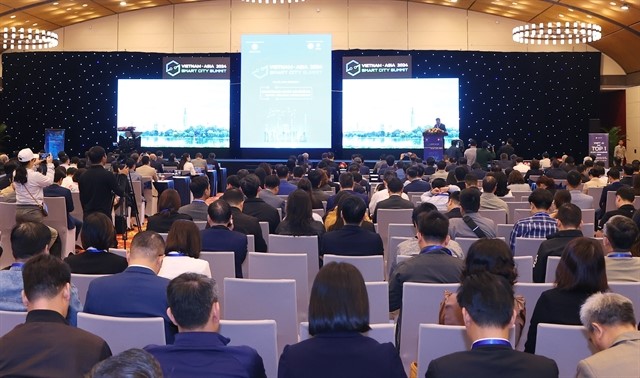The Việt Nam-Asia Smart City Conference 2024, held on Monday in Hà Nội, opened with the theme 'Smart City - Digital Economy - Sustainable Development.'

The Việt Nam-Asia Smart City Conference 2024, held on Monday in Hà Nội, opened with the theme 'Smart City - Digital Economy - Sustainable Development.'
The event gathered over 2,000 participants, including leaders from Hà Nội, representatives from various ministries, and experts in technology, urban innovation and sustainability. The conference provided a platform to discuss the future of urban development in Việt Nam and Asia, with an emphasis on digital transformation, smart city solutions and sustainable growth.
Vice Chairman of the Hà Nội People's Committee Hà Minh Hải said the conference played a significant role as part of Việt Nam's broader digital transformation efforts. The event was a key milestone in the capital's development and in responding to National Digital Transformation Day 2024. Hà Nội, alongside other cities in Việt Nam, is striving toward creating smart, modern and sustainable urban environments.
Nguyễn Văn Khoa, Vice Chairman of the Việt Nam Information and Communications Technology Association (VINASA), said Hà Nội has made progress in developing digital infrastructure, including the deployment of 12,000 5G stations and fibre-optic connections to 100 per cent of households. The city has also launched the iHanoi platform with over 1.1 million accounts and integrated more than 5.4 million health records into the national database. These efforts have enhanced public services and connectivity, which are essential components of smart city development.
Other localities have also made great strides in building smart cities, as 48 out of 63 provinces and cities have initiated smart city projects. Furthermore, more than 50 localities have established provincial Integrated Operation Centres (IOCs), with nearly 200 district-level IOCs deployed. These projects are helping local governments improve urban management, service delivery and public safety, using data-driven solutions.
“However, as the country moves forward, the challenge remains to find new drivers of growth, especially in light of rapid political, economic and technological changes. The answer lies in focusing on the digital economy, green technologies and innovation in sectors like semiconductors, AI and automotive industries,” Khoa said.
Building smart cities with data

Nguyễn Việt Hùng, Director of the Hà Nội Department of Information and Communications, said the city’s data strategy will be key to transforming Hà Nội into a smart, modern city by 2030. Data plays a crucial role in the development of digital government, digital economy and digital society. It is a core resource for enhancing economic growth, improving public service efficiency and increasing the city’s global competitiveness.
The development of a smart city is inherently tied to data-driven decision-making. Hà Nội’s strategy focuses on creating a unified, safe and efficient data infrastructure, ensuring that data systems are interoperable, secure and accessible. This will allow the city to optimise urban management, improve services and enhance citizens' quality of life.
He said that the city’s data-driven approach is also crucial for ensuring transparency, accountability and effective governance. Hà Nội’s efforts are guided by a clear vision of integrating data into all aspects of urban planning and service delivery. As part of its long-term strategy, it will prioritise areas such as urban traffic management, heritage conservation and environmental protection, using data to inform policies and ensure sustainable development.
The conference also featured insights from various experts and businesses on the status of smart city development in Việt Nam and other countries. Topics ranged from the role of AI and big data in smart city solutions to strategies for fostering digital economies and promoting sustainable urban development. Experts shared valuable experiences on implementing digital technologies, building resilient infrastructure and ensuring sustainable practices in urban management.
Hà Nội’s plan to build a smart city by 2025 is outlined in several key documents, including Resolution No 18-NQ/TU and Programme No 07-CTr-TU. These plans emphasise the digital transformation, technological innovation, and the creation of a modern, connected urban infrastructure. Hà Nội aims to integrate global best practises while addressing local needs, ensuring that its growth is inclusive, sustainable and aligned with the evolving demands of urbanisation. — VNS





